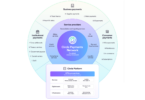The Deutsche Bank published a report analyzing the cash payments ecosystem in an age of digitalization. Based on a survey, Deutsche Bank found that cash will stay for now, and digital payments may impact the balance of global economic powers.
The German bank said digital payments would grow exponentially in the next five years and expects mobile payments to comprise two-fifths of in-store purchases in the U.S., four times the current level. In contrast, the figure is already just under 50% in China.
Meanwhile, as China and India develop crypto and digital payments, there may be a shift of global economic power to the east. China is already working on a digital yuan and were it to force companies doing business in the country to use the central bank digital currency, the dollar’s dominance in international trade could decline.
The report observed mobile payments networks started in developing economies way before they made a footprint in developed economies. For example, Alipay began in 2004. Apple Pay was launched in 2014, while Google Pay and Samsung Pay started in 2015. This can be attributed to the lack of physical banking services in developing economies, which chose the digital route to promote inclusion.
Additionally, Deutsche Bank concluded that about 45% of U.S. citizens are comfortable using an independent, non-government currency, as evidenced by the widespread use of corporate (loyalty) points for making purchases.
Deutsche Bank surveyed about 3,600 customers from six countries, four in Europe plus the U.S. and China. It found that Germany led the way in choosing cash for payments, at 59%. On the other hand, only 18% of French customers preferred cash payments. U.S. and Italy stood at 33%, while UK and China at 29% and 22%, respectively.
Among those surveyed, a common trend observed was lower-income groups preferred cash payments over digital payments in any given region. Meanwhile, age (older prefer cash) was only a significant factor in Germany and China. In the U.S. and Italy, it was reversed with a higher proportion of younger (18-34) people liking cash.
When asked if cash will survive the digital payments revolution, customers across the board believe cash will always be around. U.S., UK, Germany, France, and Italy hovered around 70%, while 58% of Chinese respondents believe cash is here to stay. However, China had an interesting gender disparity, where only 31% of females believe cash will stay against 69% of males. All respondents for the above-stated figures prefer fiat money as the primary means of payment.
Meanwhile, about 13% of UK respondents said they currently never carry cash. This is the highest figure, with the U.S. close behind at 10%, then France and China at 8%. Germany is the most cash-oriented, with only 1% of the respondents saying they don’t use cash.






